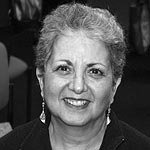Tired of bars and discos where I met men who drank and were in search of easy women, horrified by the scary men I met at church singles groups, I decided to be bold and placed a personal ad in the newspaper. “Are you out there?” the headline read.
It was 1979, before the Internet, before Herpes and HIV were in the lexicon. I didn’t tell anyone but my shrink. I made my case: I could specify the kind of guy I wanted: smart, kind, solvent. He had to love books and dogs. Surely, I could find someone suitable to date. I wanted a life partner, someone I could have children with. I was thirty-one.
Respondents wrote to a mailbox at the newspaper and the envelopes were sent in batches to my home. So many men wanted to meet me!

The first man I contacted said he was a college professor of philosophy and theology in Massachusetts, but was in Ft. Lauderdale, where I lived, on sabbatical for a year.
A year? Could we have enough time together to find out if there would be something lasting between us? “I’m looking for a real relationship,” I said.
“So am I. At least for the year I’m here,” Tom said.
We met for lunch and walked along the strip on Fort Lauderdale’s A1A, passing tourist shops and The Elbo Room, where I’d been dancing, but not inclined to go back. He said he was never married, thirty-six, though he looked older. I liked his round face, his smile, his grey beard a contrast to his darker, thinning hair.
“I love your smile,” he said.
The second time, we met for dinner. I loved hearing his thoughts on why we believe—in anything. But I didn’t give him my home address and I didn’t get into his car. When he told me where he was working—part-time, at a gas station, for some spending money during his sabbatical, I asked where it was. On my way home from my job in Miami, I stopped by, still in my hospital whites. I asked the man who came out to my car if Tom was working that day. He scowled at me and went inside the shop.
Tom came out, wiping his hands on a rag. His smile seemed forced. “I’m glad to see you! What a nice surprise.”
“Is this a bad time?” I asked.
“No, not at all! I said you could come by. How about you come to my place Saturday? I’m on the beach in a little apartment. We can eat out, take a walk again.”
“Sure.” Third date. What was he expecting? I drove home uneasy, distracted. Something was off.
On Saturday, I arrived at his apartment at six—a tiny, shabbily furnished place in an old building on the beach, probably cheap in the off-season of October. Even I’d been able to afford a ten-dollar-a-day motel on the beach when I’d arrived in ‘73.
We went out immediately to a nearby restaurant. Over dinner, I asked him about his situation at home. “Did you put your things in storage for the year?”
He shook his head.
“Did you sublet your apartment?”
“Umm…No.” He looked at me and then looked away.
“You have a roommate?”
“No.”
I waited. He didn’t offer more. Didn’t he say he was never married? Did he lie? Maybe he had a girlfriend and she was staying in his apartment. But why would he leave on sabbatical without her? Something didn’t add up. Was he paying rent on two places? Did he own a home? He hadn’t said. I’d just bought a two bedroom condo a mile from the beach.
After dinner, he said he could make coffee at his place. “I want to show you something.”
“Okay.” I wasn’t afraid of him. My instincts told me he wasn’t a killer or a rapist, but what was he?
I sat on the couch and looked around the room while I waited for him to make us coffee in the kitchenette. On the coffee table was a leather photo album. He pushed it toward me when he came back with coffee. He’s married?
I turned the pages, the facts slowly sinking in, explaining why he hadn’t told me about his living situation, why he’d hedged when answering questions. This album held photos of his ordination to the Catholic priesthood.
“You’ve left?”
“I’m on sabbatical. Like I said.”
“But why did you answer my ad?”
“I wanted to have a relationship while I was away. I didn’t want to be alone.”
I nodded. We made chitchat and I went home. He could have offered me an orgasm and absolution without leaving his bed.
For years after, whenever I went to Mass, I wondered what that priest did, what his secrets were.
***
After that third date, Tom wrote me a letter of apology for wasting my time. We stayed in touch over the years. I continued to date and meet men, got engaged to a charming European, then called it off when I discovered more lies than I could count.
Tom returned to his parish after his year away, still ambivalent about remaining a priest. Occasionally, he’d call. He’d met a young woman of nineteen in his parish, and they were spending all their free time together, occasionally getting away for overnights.
“Her family loves me,” he said.
“Do they know about your relationship?”
“Of course not. She’s twenty years younger! They don’t imagine this is anything more than my priestly interest.” He said it without irony or rancor. Or self-awareness.
When we spoke again, he’d had moved to California to start his life over.
“With your girlfriend?”
“Oh, no. When I told her I was leaving the priesthood, she was thrilled. She was sure we were getting married.”

“Of course.”
“But I wanted to be free. I’d already been married to the church for most of my life and in a relationship with her for twenty years. I was ready to be alone.” He was nearly sixty.
I’d been right at the start—he’d been married when I met him. To God.
Had he seen my face then, he would have known what I thought of him. I’d been placing ads for those twenty years, meeting men, having relationships, discovering their true identities—men who said they’d never married, but had been divorced twice, had children they hadn’t told me about, children they never saw or supported.
I moved on to Internet dating and kept trying. I finally quit—or gave up—happy to be alone and married to myself.

Share this post with your friends.


Love this, Joan. The matter of fact way you tell the story is perfect. Thank you!